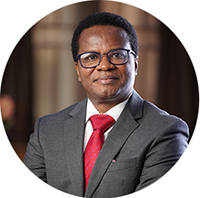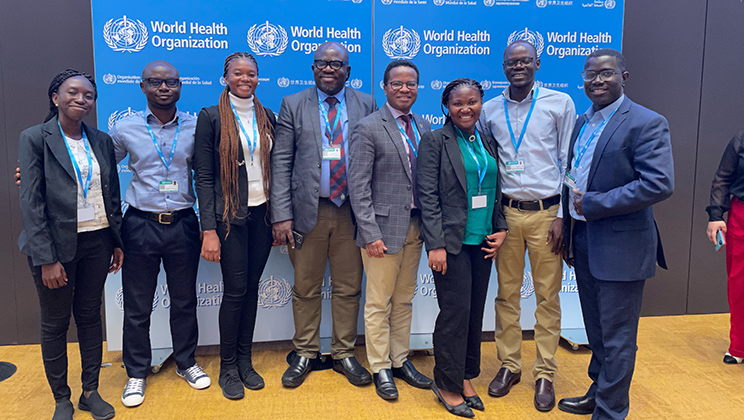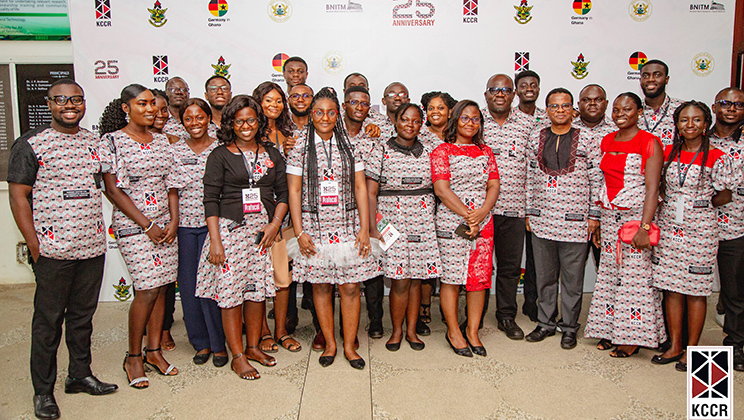Fellow profile: Professor Richard Phillips (Ghana)

EDCTP Fellow Professor Richard Phillips has established an extensive programme of research on Buruli ulcer in Ghana, in partnership with collaborators in Europe. His research has provided significant input into WHO-recommended treatments for Buruli ulcer. On the occasion of World NTD Day 2024, we asked Professor Phillips how his EDCTP Fellowship is helping advance his research to shorten the treatment of Buruli ulcer.
Professor Phillips, what inspired you to pursue a career in science?
Richard Phillips (RP): I think it all started when I was a young boy. I remember being fascinated when I accompanied my Mum on trips to research stations as part of her work investigating Mistletoe, a parasitic plant that affected cocoa and other plants, thereby reducing productivity. She once went off to Marburg in Germany to present a paper at a conference which I found an exciting career. My parents encouraged me to be a medical doctor which I completed in 1993. I always thought that taking on a career in science would be intellectually stimulating and would help me create new knowledge that would contribute to society.
I was very fortunate to have been trained and mentored by internationally renowned research scientists who encouraged me early in my career. I developed my interest in Buruli ulcer in 1997 when together with colleagues from St George’s hospital in London we established an outreach program to detect early skin lesions, which could be excised on the spot in endemic villages. This was linked to an educational program, teaching villagers to recognize Buruli ulcer at this early stage. This highly successful project was a collaboration between the KNUST, the Ghana Ministry of Health and St George’s. The work which was published in 2003 became a model for management of early disease and has subsequently been adopted by the Ministry of Health National Buruli ulcer program for other endemic districts. In 2002, I successfully competed for the Wellcome Trust Training Research Fellowship for Scientists from Developing Countries with which I completed my PhD between 2002 and 2005 under the supervision of Dr Wansbrough-Jones at St George’s in the UK who also became my career mentor. This was a major turning point in my career. Coming from a clinical background the PhD studies gave me invaluable hands-on experience in immunology, molecular biology, and microbiology. When I returned to Ghana after my PhD studies concerning the immunopathogenesis of Mycobacterium ulcerans disease in 2005, I was determined to link ongoing studies of the disease with improved management and I took the lead in setting up a growing network of treatment centres in endemic areas where young physician specialists work with health workers to diagnose and manage M. ulcerans disease. I encouraged suitable physician specialists to participate in collaborative research projects and to obtain training in research methods.

Why did you apply for an EDCTP Fellowship?
RP: Establishing a sustainable research programme in Africa requires funding. The Senior Fellowship would establish continuity with the output from previous research investments, and more recently the research supported by the MRC/DFID African Research Leader award.
The EDCTP Fellowship would develop my ability to initiate, design, plan and execute a complex clinical research programme through collaboration with others including WHO.
The Fellowship would be a potential game changer in the management and outcomes of Buruli ulcer patients. The data will be relevant to making important decisions that will influence the care of patients.
I wanted training and capacity building to form an important part of this project particularly as there is a paucity of such skills in the area of neglected infectious diseases. This Fellowship was going to have a significant impact on the pool of trained trainers. In addition, the award would help in supporting the careers of master’s students, doctoral scientists, clinicians and visiting researchers at the Kumasi Centre for Collaborative Research (KCCR).
This Senior Fellowship would open the door for increased networking between southern and northern collaborators and improve my chances of attracting additional funds from other sources.
How is this Senior Fellowship embedded in the broader efforts to shorten treatment of Buruli ulcer?
RP: Antibiotic treatment introduced over the last twenty years has transformed the outlook for patients with Buruli ulcer. Between 2000 and 2004 increasing evidence from studies in an animal model and a proof-of-concept study in humans led to the WHO recommendation to use oral rifampicin together with intramuscular streptomycin daily for 8 weeks to treat Buruli ulcer disease in humans. Controlled clinical trials carried out between 2006 and 2017 in Ghana and Benin led to the implementation of fully oral therapy with rifampicin and clarithromycin daily for 8 weeks (published in The Lancet in 2020).
Although the disease can be cured in most patients who adhere to this regimen, healing rates are highly variable even in patients with seemingly similar lesions.
Preliminary evidence from my studies in Ghana indicates two main factors contributing to variability in the healing rate, the bacterial load at baseline and the development of paradoxical reactions, with renewed inflammation, despite progressive bacterial killing by antibiotics. Eight weeks of daily combination antibiotics is also considered programmatically and logistically challenging. Shortening antibiotic therapy in Buruli ulcer treatment is the number one priority for WHO. One approach to solving this problem would be to enhance the killing of M. ulcerans. To address this, three clinical trials are currently ongoing.
As part of my EDCTP Fellowship, I have implemented a controlled clinical trial (BuruliNox) testing the use of a novel nitric oxide-generating wound dressing (EDX dressing) together with standard oral antibiotic treatment. EDX dressing promotes healing through three recognised activities: the vascular component, whereby NO influences blood vessel vasodilatation and stimulates angiogenesis, the inflammatory component whereby NO can influence the host immune response, and the antimicrobial effect, whereby NO demonstrates potent, broad-spectrum antimicrobial activity, specifically including M. ulcerans. The hypothesis is that Buruli ulcer patients who receive this EDX dressing with rifampicin and clarithromycin would have quicker killing of M. ulcerans and faster healing.
The Senior Fellow also secured funding with other collaborators and implemented two other studies aimed at treatment shortening i) testing the use higher dose (20mg/kg) rifampicin instead of 10mg/kg in the current treatment regimen for 4 weeks (BuruliRiFDACC) supported by NIHR UK ii) testing the use of triple antibiotic therapy with rifampicin(10mg/kg), clarithromycin and Amoxycillin Clavulinic acid for 4 weeks (BLMS4BU) supported by ANESVAD Spain.
A successful outcome of these studies would lead to a major shift in the duration of Buruli ulcer treatment.
How many students and junior researchers were you able to mentor as part of your fellowship, and where are they now?
RP: I have mentored 17 PhDs during my EDCTP Fellowship (2 completed, 7 to complete in 2024, 2 to finish in 2025 and 6 to finish in 2026). Three of these were directly sponsored by my Fellowship and are submitting their thesis in 2024.
During my Fellowship 10 MPhil completed training (2 were funded by the Fellowship, 8 were funded through other research grants held at KCCR in KNUST). Nine out of ten trained MPhils are doing their PhDs on other grants. One is awaiting the opportunity to do a PhD and currently leads one of our studies on Leprosy. Thirteen MPhil students are currently in training (8 have submitted already, 5 are to submit their thesis in 2024)
My junior scientists have been diligent in applying themselves to all tasks assigned to them. My experience in developing students and junior researchers continues to grow.

How has this Senior Fellowship allowed you to progress to a position of leadership locally, regionally, or globally?
RP: The EDCTP Senior Fellowship award has helped me to maintain the momentum and advance my research.
Local
I gained promotion from Senior Lecturer to Associate Professor and in 2020 as Full Professor in Medicine.
I was appointed Director of the Kumasi Centre for Collaborative Research (KCCR) at the Kwame Nkrumah University of Science and Technology (KNUST) in Kumasi. KCCR is a joint venture between the KNUST, the Ministry of Health Ghana and the Bernard Nocht Institute for Tropical Medicine, Germany. KCCR employs about 400 staff. I provided leadership for this highly successful research centre throughout my EDCTP Fellowship.
I led and navigated KCCR through the difficult periods of the COVID-19 pandemic resulting in local, national and international recognition of the Centre as the second-largest PCR testing centre in Ghana. I received an award from the President of Ghana on behalf of the Centre in 2023, for outstanding contribution to the Nation during COVID-19 pandemic. I was a Member of the Ghana National COVID-19 Laboratory Testing Committee that provided oversight and technical direction to the COVID-19 testing laboratories during the pandemic.
KCCR currently hosts the secretariat for the African Research Network for Neglected Tropical Diseases (ARNTD). I serve as a member of the Management Board member for Network of African Researchers for Neglected Tropical Diseases (www.arntd.org). ARNTD runs a small grants programme (SGP funded by USAID) for African Scientists to support early career researchers working on Neglected tropical diseases.
Currently, I am Vice Chair of the Ghana IntraCountry Coordinating Committee (ICCC) for NTDs, a high-level body that reports to the Minister for Health in Ghana.
Regional
I served as a member of the NTD Regional Programme Review Group (RPRG) established by WHO.
International
I am currently Vice Chair of the WHO Working Group on treatment of Skin Neglected Tropical Disease
I have given lectures/talks at international meetings such as the WHO Annual meeting on SkinNTDs, European Congress of Clinical Microbiology and Infectious Diseases (ECCMID), American Society of Tropical Medicine and Hygiene(ASTMH), American Society of Microbiology(ASM) and the World Health Summit
Research
The quality of my research outputs has gained increasing recognition. My authored/co-authored peer-reviewed publications have increased from 112 to over 220 publications. My most influential paper has increased from 265 to 2022 citations.
Grant reviewer role
I reviewed grants for UK National Institute of Health and Care Research (NIHR), The Wellcome Trust, African Research Network for Neglected Tropical Diseases (ARNTD) small grants programme, Africa Research Excellence Fund (AREF) Research Development Fellowship and the KNUST Research Fund (KREF).
Editorial roles
I served in different roles for PLOS NTD. I served as Associate Editor for PLOS Neglected Tropical Disease, Deputy Editor for PLOS Neglected Tropical Disease, Section Editor for PLOS Neglected Tropical Disease and Academic Editor for PLOS Neglected Tropical Disease.
What would you like your legacy to be?
RP: Considering the lack of a critical mass of research scientists, particularly in the area of neglected infectious diseases, I am passionate about leaving behind a legacy of “homegrown” world-class researchers who can address pressing research questions in Africa. Indeed, the generation of local research and the ability to innovate and use research results are essential for good policy-making and ultimately for better health outcomes.
In the field of Buruli ulcer disease, my vision is to see highly improved management of the disease with respect to its diagnostic confirmation, treatment and care such that all patients have access to easily delivered and highly effective management. I am optimistic that this can be realized in my lifetime considering the recent advances and new insights in research.
